the history of yeovil's pubs
PUBS HOME PAGE |
PUBS INTRODUCTION |
PUBS BY NAME |
BEERHOUSES |
golden lion
79 Park Street / 96 Park Street
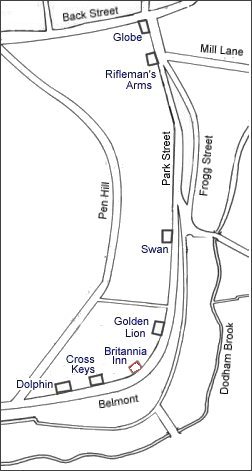 The
Golden Lion was
the symbol of
Henry I
(1086-1135).
The
Golden Lion was
the symbol of
Henry I
(1086-1135).
Park Street was built between 1825 and 1830 by Peter Daniell in the grounds of his Penn House, so the Golden Lion Inn dates from after this time, and certainly by 1850, but the building itself was probably built by 1831 as most of the western side of Park Street appears to have buildings shown on Watts' map of Yeovil dated 1831.
Another of the Park Street pubs (few of which appear to have been photographed) the Golden Lion was recorded as such for nearly a hundred years.
It clearly began life as a beerhouse and is described as such in the early records below but, very unusually, it actually had a name from almost the very beginning.
A public house license may have been obtained for the establishment but, confusingly, the licensees were often described as beer retailers during the nineteenth century whether it was a beerhouse, public house or simply a shop with off-sales. In September 1862 the first known landlord, John Hambridge, applied for a license and it was noted that he "had kept a beer-house for thirteen years very properly." This would mean that, assuming he was always in the same property (which he owned), the Golden Lion would have started around 1849.
In July 1890 the Western Gazette noted that "The Golden Lion Outing Club, to the number of about twenty, enjoyed their annual excursion on Saturday. The place selected being Weymouth, to which place they were conveyed in a break drawn by four horses."
During the 1890s (at least) the Golden Lion was a tied house of the Somerton Brewery and was referred to as the 'Golden Lion Beerhouse and Shop'.
It was still called a beerhouse in the 1901 census and a small beer house in the 1911 census. In February 1908 the renewal of the Golden Lion's license was objected to (amongst others) at the Borough Petty Sessions as the Bench deemed it was "very desirable that a further reduction be made" in the number of Yeovil's public houses.
The license was considered at the Petty Sessions the following month when Police Sergeant Boobyer gave evidence that "The Golden Lion, Park Street, was a general shop and bar combined, and there was a lodger's kitchen and a smoking room. There was stabling for two horses with a loft over, and a back yard with a side entrance. The Swan was 103 yards away, the Rifleman's Arms 185 yards and the Globe 251 yards off. The house was used by lodgers, and there was a certain amount of bottle trade."
In any case, the Golden Lion continued into the 1950s.
|
Yeovilians remember... The following is from a cutting from the Western Gazette of some twenty years ago (for the full article click here). "Mr Arthur Holt... used to play football in the Swan pub's football team over at New Walk which is now the children's play area at Nine Springs. Every Easter Monday the Swan's team used to play against The Golden Lion. Mr Edward Jeans remembered one of the matches, which took place after the pubs turned out. One of the landlords was a goalkeeper and after the match the teams threw the referee in the river because they did not agree with his decisions. "They were nearly all boozed before they even went out" said Mr Jeans." |
![]()
The first listed licensee, John Hambridge, was born about 1810 in Yeovil. In the 1841 census he was listed living in South Street with his wife, Mary née Batty (b1815), and their two children. John's occupation was listed as glover. By 1850 he was listed as a beer retailer in Belmont and by the time of the 1851 census the family now included seven children. Both John and Mary as well as four of their children (including a 9-year old) were working as glovers but John and Mary were clearly running the Golden Lion between them. In 1861 John's family was listed in Park Street although this is most likely the same house since the distinction between Belmont and Park Street always seems to have been vague. John was listed as a grocer and beer house keeper at the Lion Beer House. In September 1862 John applied to the Borough Petty Sessions for a license and as part of his application it was said that he "had kept a beer-house for thirteen years very properly. He asked for a license for the house of which he was the owner." The application was refused, along with most of the other applications, because the Bench decided ".... there was ample provision in the town." John died in the autumn of 1865.
His wife, Mary, was born in Yeovil around 1815. After the death of her husband Mary assumed the license of the Golden Lion Inn and in the 1871 census is listed as grocer and beer house keeper. The building she occupied with her children; cabinetmaker Herbert aged 27, 21-year old Emily and 17-year old draper's assistant William, was specifically called a beer house in the census' address column, which was extremely unusual for the time. Mary died in the autumn of 1877, aged about 62.
Sarah Stockey was born about 1839 at Sparkford, eight miles northeast of Yeovil. In the 1881 census Sarah, unmarried and aged 42, was living on her own at the Golden Lion Inn and listed as its innkeeper. I could find no further mention of Sarah in the records either before or after 1881.
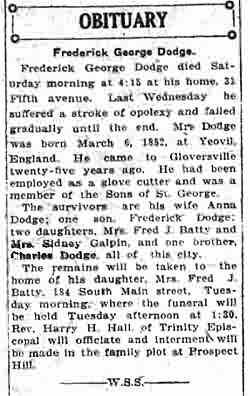 Frederick
George Dodge was
born 6 March
1852 in Yeovil,
the son of
glover and
leather dresser
Elisha Dodge and
his wife,
Jemima, née
Culliford, a
dressmaker. In
the 1861 and
1871 censuses
the family,
including
Frederick's
three siblings,
were listed as
living in
Belmont. In
September of
that year
Frederick
married Anna
Maria Dade in
Yeovil.
Frederick
George Dodge was
born 6 March
1852 in Yeovil,
the son of
glover and
leather dresser
Elisha Dodge and
his wife,
Jemima, née
Culliford, a
dressmaker. In
the 1861 and
1871 censuses
the family,
including
Frederick's
three siblings,
were listed as
living in
Belmont. In
September of
that year
Frederick
married Anna
Maria Dade in
Yeovil.
In the 1881 census Frederick was listed as a glove cutter and he, Anna and their three children were living at 63 Park Street, next door to Frederick's parents. In 1891 Frederick was listed as the publican of the Golden Lion Inn at 79 Park Street where he was living with Anna, their three children and Anna's widowed mother, Alice Dade.
Frederick was listed as licensee in Kelly's Directory of 1895 but this same year he and his family emigrated to Gloversville, Fulton County, New York, USA, which at the time was the hub of the United States' glove-making industry. Frederick worked as a glove cutter and died in Gloversville on 4 December 1919 and his obituary, reproduced here, is from the Gloversville Morning Herald.
Charles Abbott was born in Yeovil in September 1849 the son of Leah Abbott. In the 1851 census, Leah is listed as married (but her husband isn't listed) and living as a pauper glover in Deans Court off Middle Street. Deans Court was slum housing for the very poorest, where typhoid was quite common since the eight dwellings in the court shared one privy. The privy was so close to the well (from which occupants of Deans Court obtained their drinking water) that the privy actually drained into the well. In the 1901 census Charles was living at the Golden Lion (although it was not named and only listed as a public house) with his wife, Sarah, and their four daughters. His occupation was described as mason's labourer. It transpires that Sarah was Charles' second wife and they were married in Yeovil in April 1899 - it is difficult to establish his first wife as there were more than one Charles Abbott living in Yeovil at this time however in the 1911 census his daughter, Bessie, has an annotation 'daughter of the first wife'. The census also lists Charles' occupation as small beer house keeper at 96 Park Street. Charles died in March 1912 and the license of the Golden Lion was taken on by Sarah at least until 1914 when she was listed as a beer retailer and shopkeeper in Kelly's Directory of that year although she had been known as the landlady of the Golden Lion at least since 1901 as seen in the following newspaper report -
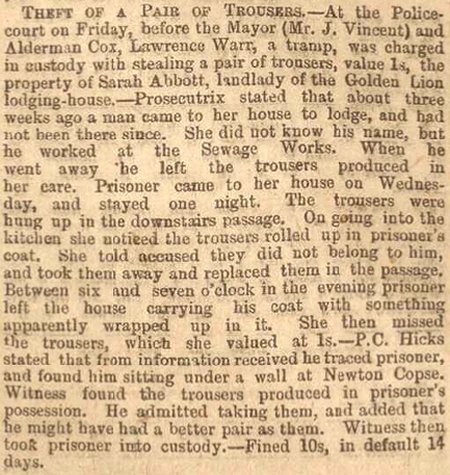
Western Gazette
- 19 July 1901
Following Sarah Abbott's departure, the Golden Lion was briefly run by Eustace Pierce in the early 1920’s and then for more than fifteen years by his widow, Minnie, from the 1930’s to the early 1950’s.
Gallery
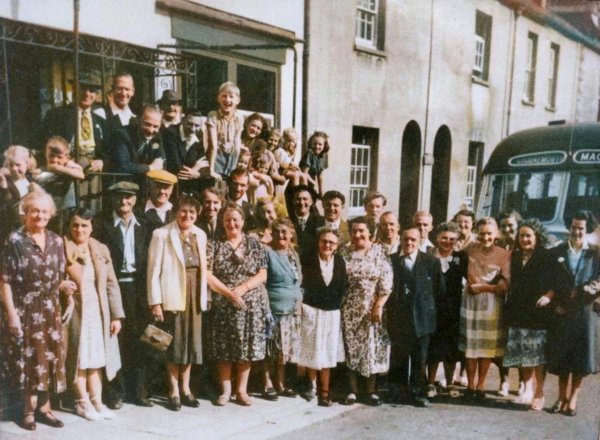
Courtesy of Lou
Pearce
Golden Lion regulars and their families prepare for a day trip to Bournemouth in a colourised photograph of 1950.
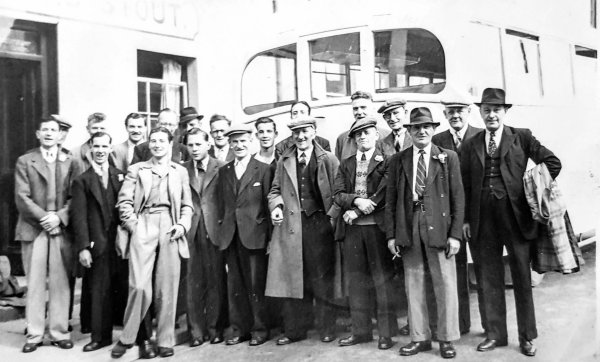
Courtesy of
Maxine Hawker
Regulars of the Golden Lion prepare for a day outing during the early 1950s.
licensees
1850 – John
Hambridge – Beer
Retailer (Hunt &
Co's 1850
Directory)
listed as
Belmont
1861 – John
Hambridge –
Grocer & Beer
House Keeper
(1861 census) as
Lion Beer House
1861 – John
Hambridge – Beer
Retailer and
Shopkeeper
(Kelly's 1861
Directory)
1862 – John
Hambridge –
License refused (Borough
Petty Sessions)
1871 – Maria
Hambridge –
Grocer & Beer
House Keeper
(1871 census)
listed as Beer
House
1878 – Sale of
belongings of
deceased Mrs
Hambridge
(Western
Gazette,
December)
1881 – Sarah
Stockey – Inn
Keeper (1881
census) listed
as the Golden
Lion Beer House
1887 – Sarah Stockey
– license
transfer (Petty
Sessions, May)
as Golden Lion
1887 – Frederick
Dodge – license
transferred (Petty
Sessions, May)
1888 – Mr C
(sic)
Dodge – landlord
(Western
Gazette, 14 Sept)
as Golden
Lion Inn
1891 – Frederick
Dodge – Publican
(1891 census)
listed as Golden
Lion Inn
1895 – Frederick
Dodge – Beer
Retailer
(Kelly’s 1895
Directory) pub
not named
1897 – Frederick
Bugler – Beer
Retailer
(Kelly’s 1897
Directory)
listed as Golden
Lion
1901 – family of
Charles Abbott,
Mason’s
Labourer, in
residence (1901
census) as Beer
House
1908 – Messrs
Ord, Battiscombe
& Elwes of
Somerton Brewery –
owners (Petty
Sessions)
1911 – Charles
Abbott – small
beer house
keeper (1911
census) listed
as Public House
1913 – Fred
Gapper - license
transfer from
Mrs Abbott
(Petty Sessions)
1914 – Sarah
Abbott – Beer
Retailer &
Shopkeeper
(Kelly’s 1914
Directory) pub
not named
1923 – Eustace
Pierce – Beer
Retailer
(Kelly’s 1923
Directory) pub
not named
1936 – MH Pierce
(1936 Yeovil
Directory)
listed as Golden
Lion
1939 – Minnie
Pierce (Kelly’s
1939 Directory)
listed as Golden
Lion PH
1947 – MH Pierce
(1947 Yeovil
Directory)
listed as Golden
Lion
1949 – MH Pierce
(Kelly’s 1949
Directory)
listed as Golden
Lion
1951 – MH Pierce
(1951 Yeovil
Directory)
listed as Golden
Lion
1954 – FG
Millard (1954
Yeovil
Directory)
listed as Golden
Lion